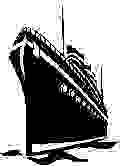| |
WRC
|
 |
| |
|
|
 LABORATORY OF ACOUSTIC PROBING
OF THE OCEAN LABORATORY OF ACOUSTIC PROBING
OF THE OCEAN |
|
 |
| |
The laboratory studies low frequency sound propagation and
scattering at the marine shelf. Physical methods of shallow water acoustic
tomography were worked out at the laboratory including the methods of
acoustic tomography based on the matched field signal processing.
V. M. Kuz'kin, D.Sc.
A. Yu. Lubchenko, Ph.D.
A. V. Ogurtsov, Ph.D.
V. D. Oppengeim, Ph.D.
The laboratory is headed by V. G. Petnikov, D.Sc.
Special equipment for acoustic ocean probing includes:
a towed underwater device with sound sources (radiation power 500 W,
operating frequency 100 and 220 Hz, relative frequency band of radiation
10%);
vertical arrays 72 m in length with 12 receivers;
auxiliary equipment for arrangement of a stationary acoustic track
(for positioning of the underwater device and vertical arrays at the sea
bottom).
Measurements of attenuation of low-frequency sound waves were carried
out at the range up to 400 km in the Barents Sea.
The first experiments were realized at a stationary acoustic track
in this area. The typical amplitude and phase fluctuations of sound
field produced by large scale hydrodynamic variability of the medium
were recorded. The variations of phase front of an acoustic wave were
measured.
Dispersion properties of a bottom sound channel that is characteristic
of the Barents Sea were studied.
Original techniques for determination of averaged acoustic parameters
of the sound channel were suggested and tested. The methods are based
on matched-field signal processing and use the results of measurements
of the interference pattern of a sound field as the initial data.
An approximate method was developed for solution of the problem of
acoustic wave diffraction by localized inhomogeneities in a sound channel.
A model of the sound field perturbations produced by a moving inhomogeneity
was developed.
|

|

